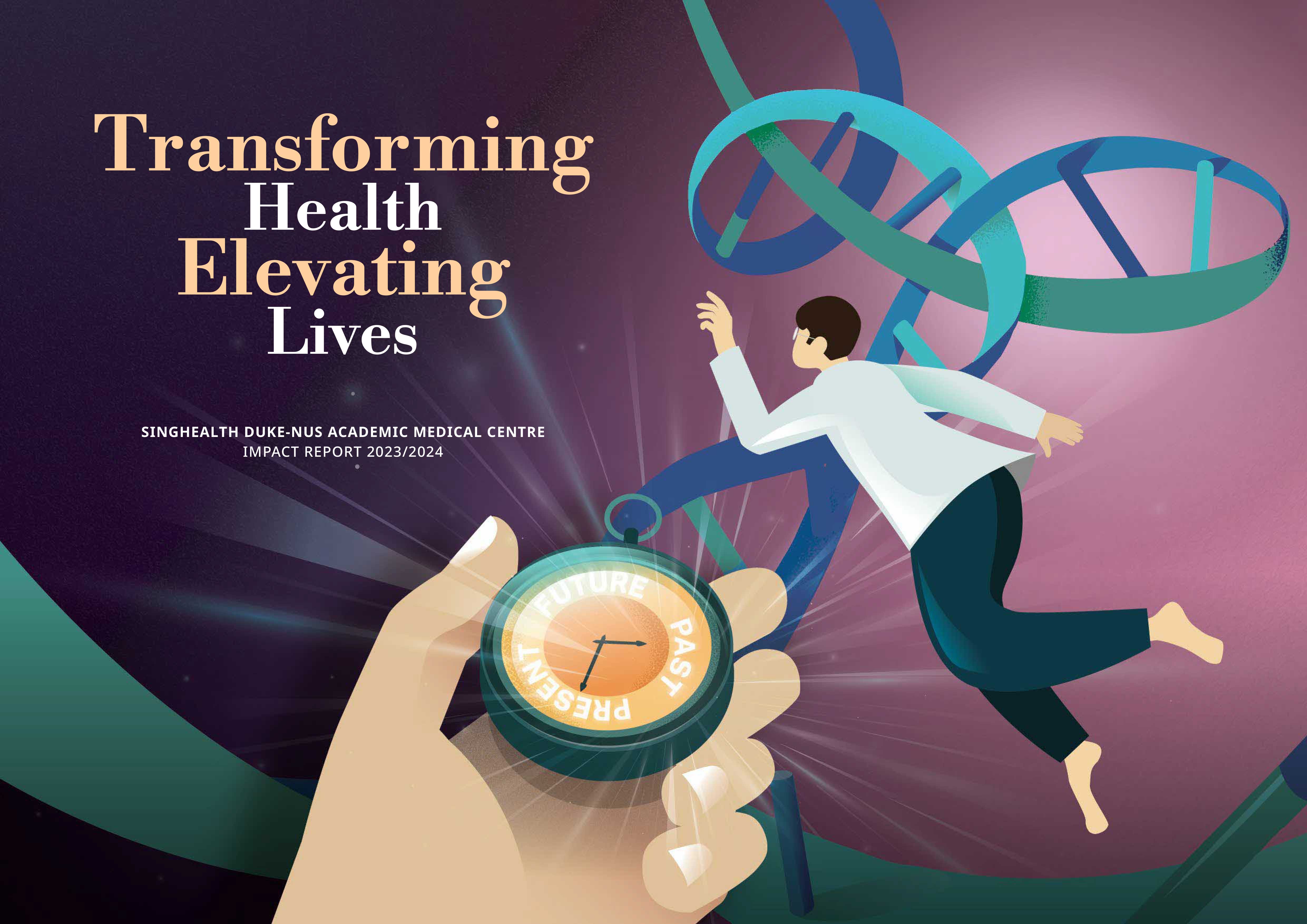SingHealth Duke-NUS Academic Medical Centre Impact Report 2024/2025
Our Defining Moments
For the last 25 years, we have made choices that have transformed healthcare and impacted countless lives. These defining moments are as much ours as our patients. Join us on our journey to healthcare excellence!
Visit the microsite
Download the Annual Overview (Facts & Figures) here

SingHealth Duke-NUS Academic Medical Centre Impact Report 2023/2024
Transforming Health, Elevating Lives
Hi, my name is Dr X and it is the year 1925. Follow my journey to 2024 as I discover how Singapore healthcare has changed 100 years into the future.
Read the Impact Report in PDF format here.
Download the Annual Overview (Facts & Figures) here.

SingHealth Duke-NUS Academic Medical Centre Annual Report 2022/2023
Centering Our Care Around You
Our 2022/2023 Annual Report highlights the AMC's achievements in academic medicine and how through Healthier SG, we empower residents to keep well, get well and live well.
Download the Annual Overview (Facts & Figures) here.
Read the Annual Report in flipbook format here.

SingHealth Duke-NUS Academic Medical Centre Annual Report 2021/2022
Spearheading the Future
Hear from our healthcare professionals as they share about healthcare innovation in their respective professions, and how these efforts will pave the way forward for future healthcare advancements.
Download the Annual Overview (Facts & Figures) here.
Read the Annual Report in flipbook format here.

SingHealth Duke-NUS Academic Medical Centre Annual Report 2020/2021
Celebrating 200 Years of Transformative Medicine
As we celebrate 200 Years of Medicine in Singapore, hear from some of SingHealth’s very own, who share their transformative journeys in their respective professions.

SingHealth Duke-NUS Academic Medical Centre Annual Report 2019/2020
Stronger Together
We turn 20 this year! Read about SingHealth’s journey, featuring our staff who have been with us the last two decades and how we stand united as one SingHealth family to fight against COVID-19.

SingHealth Duke-NUS Academic Medical Centre Annual Report 2018/2019
Standing Strong
With better access to information in this digital age, the “doctor knows best” model has changed. Healthcare today is characterised by close collaboration between healthcare providers, patients and their caregivers. Patients and their caregivers provide valuable perspectives and are important partners in the care journey.
Download the Annual Overview (Facts & Figures) here.

SingHealth Duke-NUS Academic Medical Centre Annual Report 2017/2018
The Human Touch
Beyond systems, processes and care models, our patients' success stories and determination to live their lives to the fullest motivate all of us to do better and continually challenge norms to deliver innovative care while retaining the personal touch that is the foundation of good healthcare.
Download the Annual Overview (Facts & Figures) here.
SingHealth Duke-NUS Academic Medical Centre Annual Report 2016/2017
Journey Home: Beyond Hospital Walls
Our Academic Medical Centre is a beacon of hope for many patients, such as Madam Yee Yok Chun (pictured on cover). Her speedy recovery from liver cirrhosis and subsequent liver transplant was made possible by integrated care between our specialties and institutions. Read about the journeys of Mdm Yee and other patients like her in our latest annual report.Download the Annual Overview (Facts & Figures) here.

SingHealth Duke-NUS Academic Medical Centre Annual Report 2015
Future of Healthcare
From within our institutions to the rich partnerships we forge with research collaborators, the community and many like-minded agencies, we strengthen our core pillars of excellent clinical care, vigorous medical education, and innovative research. The stories of our people and their work make up the pages of this year’s annual report – Future of Healthcare.
SingHealth Duke-NUS Academic Medical Centre Annual Report 2014
Imprints of Healthcare
Imprints of Healthcare celebrates the successes of our patients against their disease, told through up-close interviews and photographs of them in their elements. Also in the 2014 Report are stories of our staff from the SingHealth Duke-NUS Academic Medical Centre. Their personal accounts reaffirm our purpose in healthcare and inspire us to greater heights. Find out more about us in Imprints of Healthcare - the SingHealth Duke-NUS Academic Medical Centre Annual Report 2014.
SingHealth Duke-NUS Academic Medical Centre Annual Report 2013
Faces of Healthcare
The strategic partnership between SingHealth and Duke-NUS Graduate Medical School is founded on a shared vision, a common purpose to bring the best in treatments and outcomes to our patients. Our first joint annual report celebrates our journey and advances which were fuelled by passion and curiosity. It pays tribute to the people behind our milestones and achievements. It celebrates the collaborations that go beyond our institutions. Click here to view the full SingHealth Duke-NUS Academic Medical Centre Annual Report 2013.
SingHealth Annual Report 2012
Strength Through Collaboration
Featuring over 20 inspiring stories on themes ranging from nursing education, life-changing research breakthroughs, to initiatives that improve healthcare delivery, we look at how various partnerships and collaborations have led to great strides in patient care, education and research in Strength through Collaboration.
SingHealth Annual Report 2011
Defining Tomorrow's Medicine
The SingHealth Annual Report FY2011 - "Defining Tomorrow's Medicine" showcases our Academic Medicine journey and centres on the integration of our triple mission - clinical care, research and education.In this report, you will meet patients whose lives have been transformed by our care and touched by our healthcare professionals. You will also meet staff whose passion and determination in pursuing better experiences and better outcomes for our patients have allowed us to progress so far.



















